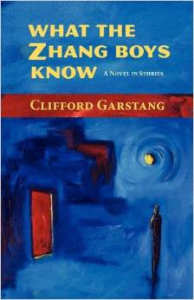2/10/2015—BOOK REVIEW: WHAT THE ZHANG BOYS KNOW BY CLIFFORD GARSTANG
2/10/2015—BOOK REVIEW: WHAT THE ZHANG BOYS KNOW BY CLIFFORD GARSTANG
In social psychology, the proximity principle says that people tend to form interpersonal relations with those who are close by. What the Zhang Boys Know by Clifford Garstang confirms that principle and also tests it severely by gathering a multi-racial, multi-cultural, multi-generational group of people as residents in a Washington, D.C., condominium building called Nanking Mansion. A Chinese father and his two sons, an African-American lawyer, a painter, a sculptor, a gay aspiring poet, and an unemployed woman who’s selling her jewelry so she can eat are among the people trying to make their way in this minimally refurbished building in a neighborhood that’s just beginning to turn around.
form interpersonal relations with those who are close by. What the Zhang Boys Know by Clifford Garstang confirms that principle and also tests it severely by gathering a multi-racial, multi-cultural, multi-generational group of people as residents in a Washington, D.C., condominium building called Nanking Mansion. A Chinese father and his two sons, an African-American lawyer, a painter, a sculptor, a gay aspiring poet, and an unemployed woman who’s selling her jewelry so she can eat are among the people trying to make their way in this minimally refurbished building in a neighborhood that’s just beginning to turn around.
Each of these people is worthy of attention. One of Garstang’s strengths as a writer is his ability to make each character distinctive, totally distinguishable from other characters in action, thought, and language. In an interview posted here January 10, Garstang said his favorite characters in the novel are the young brothers Simon and Wesley Zhang, the unemployed woman Claudia, and Nathan, who’s a novelist. One of my favorites is Zhang Jian-ping, the brothers’ grandfather, who gives up everything and every person he knows in Shanghai to come to the United States to care for his grandsons when their mother is killed in a car accident. And I keep thinking about the poet who admits that he and his partner stayed together because they both independently realized they could do no better. Such insight into the human spirit is typical of Garstang’s characterizations.
And yet, as memorable as each character is, the soul of the novel is the way their interactions with each other exacerbate or resolve their problems. Many, in fact most, of the characters are dealing with losing the person they love. Partners die or relationships end. “They don’t come back,” the lawyer thinks. “Even when they’re not dead. . . . They leave a void, and that void never gets filled.”
The world of Nanking Mansion has many voids, both physical and emotional, all tied to who the characters are. There’s the hole the lawyer knocks in his condominium wall, letting in pigeons and wind; the blank space on the lobby wall after the painter secretly removes his painting and drags it back to his condo to slice it to shreds; the emptiness in the cup after Susanna, living with her boyfriend in a rented condo, takes the money stored in the cup without telling the boyfriend; and the reaction of Jessica, the Zhang boys’ father’s new wife, when she happens upon a car crash in the neighborhood: “She thinks of Maddie and her accident, the gaping hole in the Zhang family that Jessica is meant to fill. Her stomach convulses and she vomits in the street.”
Filling the voids—or not filling the voids—pushes the characters forward.
What the Zhang Boys Know is a novel-in-stories, and Garstang skillfully uses the construction to accentuate the action. Each chapter is a story that stands alone, but the impact of the book comes from the way the chapters interact. In the same way, each character is an interesting individual, but what matters is how they affect each other.
Garstang’s writing style includes little dialogue, but I hardly noticed the absence because the prose flows so smoothly. When I finished reading the book, I went back and read the first few chapters again, just because I enjoyed being in the world of Nanking Mansion. This is a book that warrants re-reading, both the individual chapters, many of which appeared first in literary magazines, and the effective whole that together they create.
Sally Whitney
Sally Whitney is the author of When Enemies Offend Thee and Surface and Shadow, available now from Pen-L Publishing, Amazon.com, and Barnesandnoble.com. When Enemies Offend Thee follows a sexual-assault victim who vows to get even on her own when her lack of evidence prevents police from charging the man who attacked her. Surface and Shadow is the story of a woman who risks her marriage and her husband’s career to find out what really happened in a wealthy man’s suspicious death.
Sally’s short stories have appeared in magazines and anthologies, including Best Short Stories from The Saturday Evening Post Great American Fiction Contest 2017, Main Street Rag, Kansas City Voices, Uncertain Promise, Voices from the Porch, New Lines from the Old Line State: An Anthology of Maryland Writers and Grow Old Along With Me—The Best Is Yet to Be, among others. The audio version of Grow Old Along With Me was a Grammy Award finalist in the Spoken Word or Nonmusical Album category. Sally’s stories have also been recognized as a finalist in The Ledge Fiction Competition and semi-finalists in the Syndicated Fiction Project and the Salem College National Literary Awards competition.
- Web |
- More Posts(67)